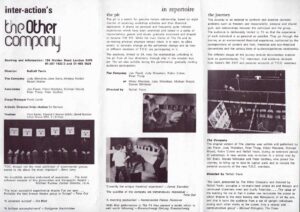Naftali Yavin was born in Haifa Israel in 1936. He read philosophy at the University of Tel Aviv and trained at the Habimah National Drama School, playing many leading roles at the Habimah and working as assistant director to Sir Tyrone Guthrie, Andre Brasak and others. He went on to set up his own experimental theatre company in Israel, winning the Israeli Arts Council award for best play in 1965. A British Council Bursary took him to study for a postgraduate diploma in theatre at Manchester University, where Stephen Joseph was an important influence. He met ED Berman in 1967 who invited him to set up first the Experimental Workshop at the first International Theatre Club at the Mercury Theatre in Notting Hill and later TOC: The Other Company as part of the newly-formed Inter-Action in 1968, performing at the Ambiance and was interested in exploring environmental theatre and especially power games and relationships in the family and other groups. He moved into the Inter-Action communal living space in Chalk Farm Road and later in Malden Road and Kentish Town.
Yavin’s own play: Precious Moments from the Family Album To Provide You with Comfort in the Long Years to Come (1967) was originally presented at the University Theatre in Manchester in July 1967 and then restaged at the Mercury that December. The publishers Calder and Boyars describes it thus:
‘The six pictures in this very amusing and penetrating play are six separate scenes in the life of one family, to be performed in any order or with any combination of two or more scenes. Cocking snooks at the frail structure on which matriarchal society is built, at Freudian analysis and collectors’ mania, it also examines with great insight and seriousness the way in which each member of the family will fight to maintain what he or she considers his position within the unit, the effect of different parental attitudes from indifference to misplaced understanding, on their bewildered children and the binding force which can cut a family off from the outside world. At the same time the play lays bare the much wider existential, moral and sociological problems underlying the relations of the individual with his world.
Five characters, representing three generations, each make equally valid contributions to the stimulating, humorous and fast-moving action of the play, speaking turn-by-turn in monosyllabic abuse in childish endearments, in the desperate incoherence of the frustrated desire to communicate and the daily hyperbole of unthinking familiarity. Though each picture has a definite style of its own, together they make a striking whole.’
Yavin went on to direct ED B’s (Berman’s playwriting alias) Sagittarius and Virgo (1968) which toured to Brighton, Birmingham and elsewhere and then directed African-American playwright Ed Bullins’s It Bees That Way and Vic Corti’s Arrest as part of Inter-Action’s Black and White Power Season, presented as the Ambiance-In-Exile at the ICA.

Inter-Action’s The Other Company 2-fold publicity leaflet describing the repertoire 1971 side one
For TOC (The Other Company), the physical and experimental theatre arm of Inter-Action that he founded, he developed the devised environmental piece The Pit (1969), which explored master-slave power relationships. Highly acclaimed, the company toured the show to Germany. They went on to develop The Journey (Oval House, 1971), exploring freedom and responsibility, personal and shared guilt. He also directed James Saunders’s Games After Liverpool and acclaimed productions of Peter Handke’s Offending the Audience, Self Accusation (1972) and Calling for Help.
Naftali Yavin tragically died in 1972.
